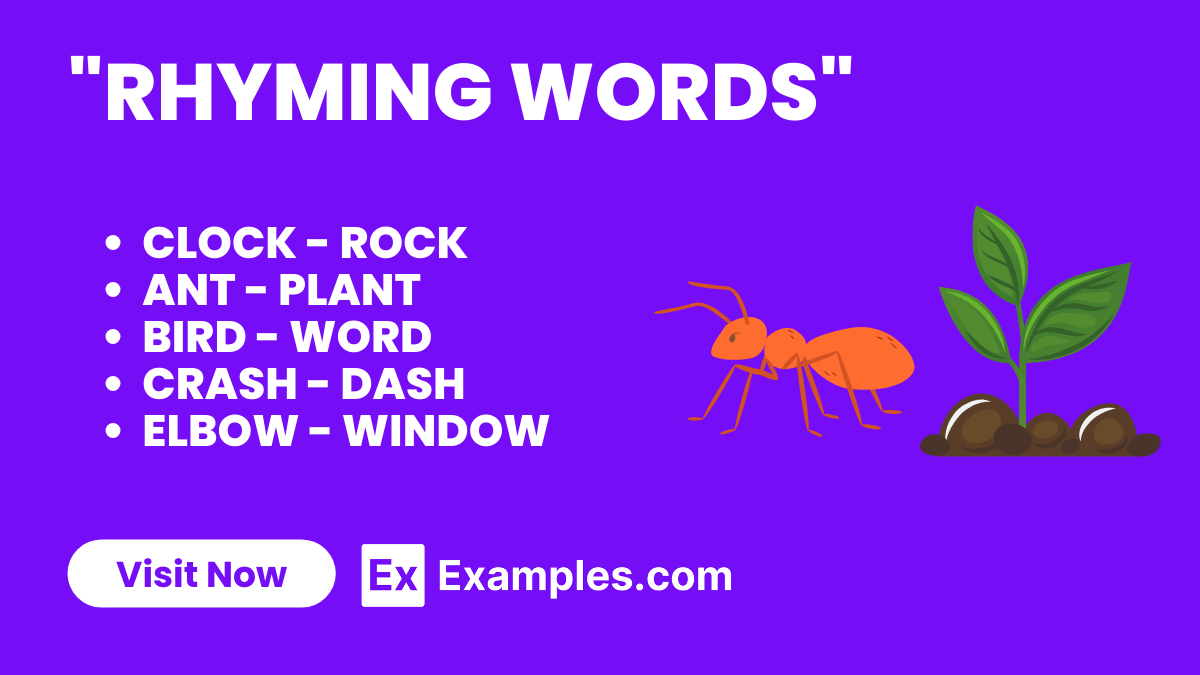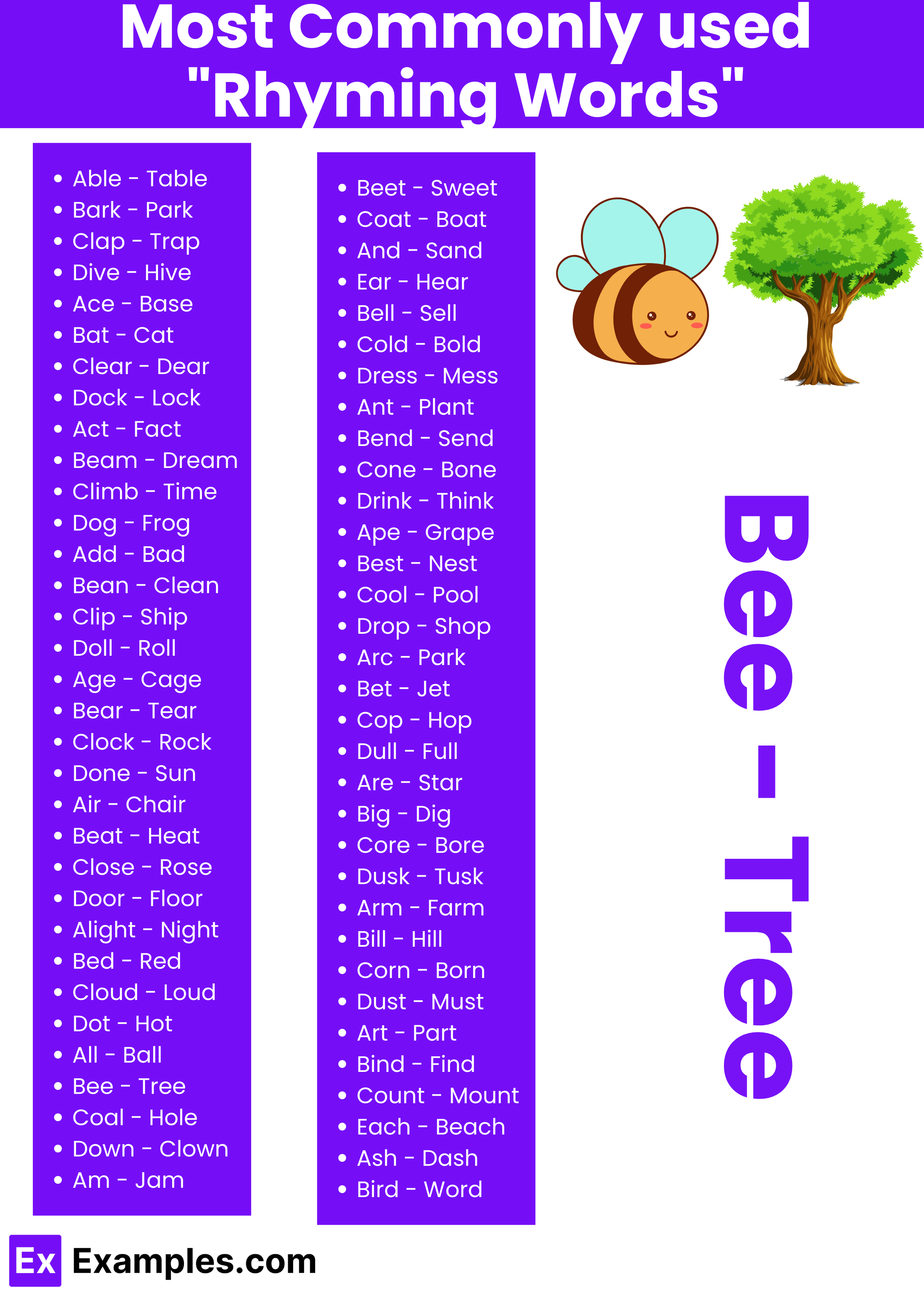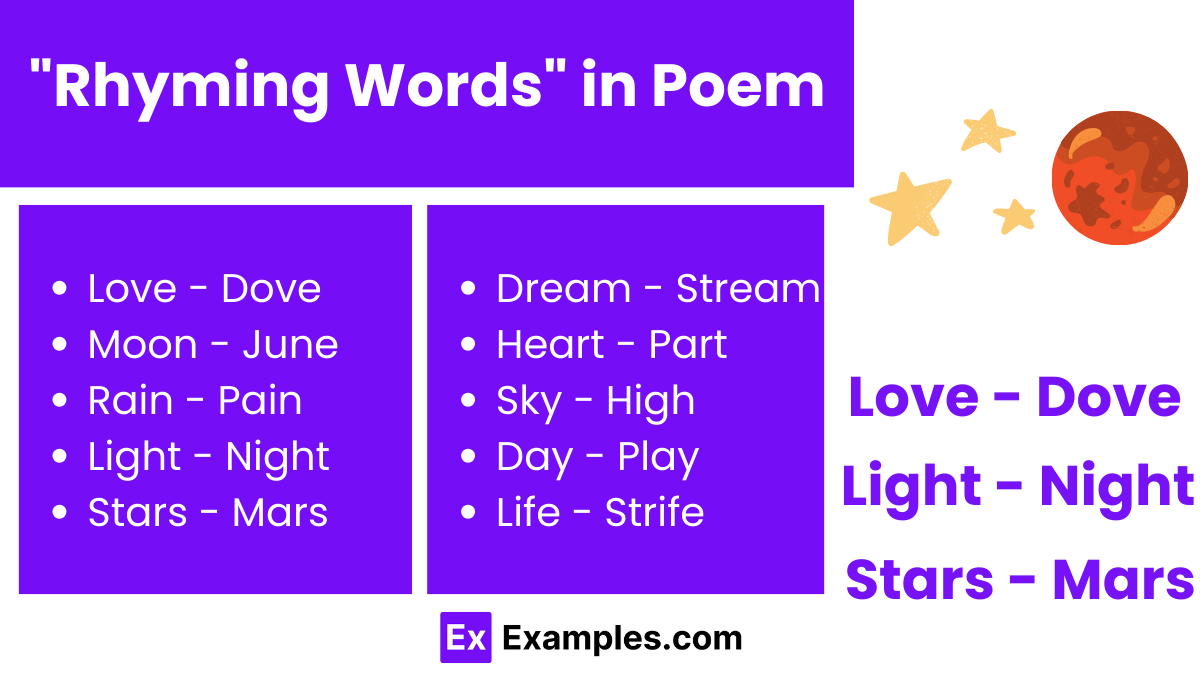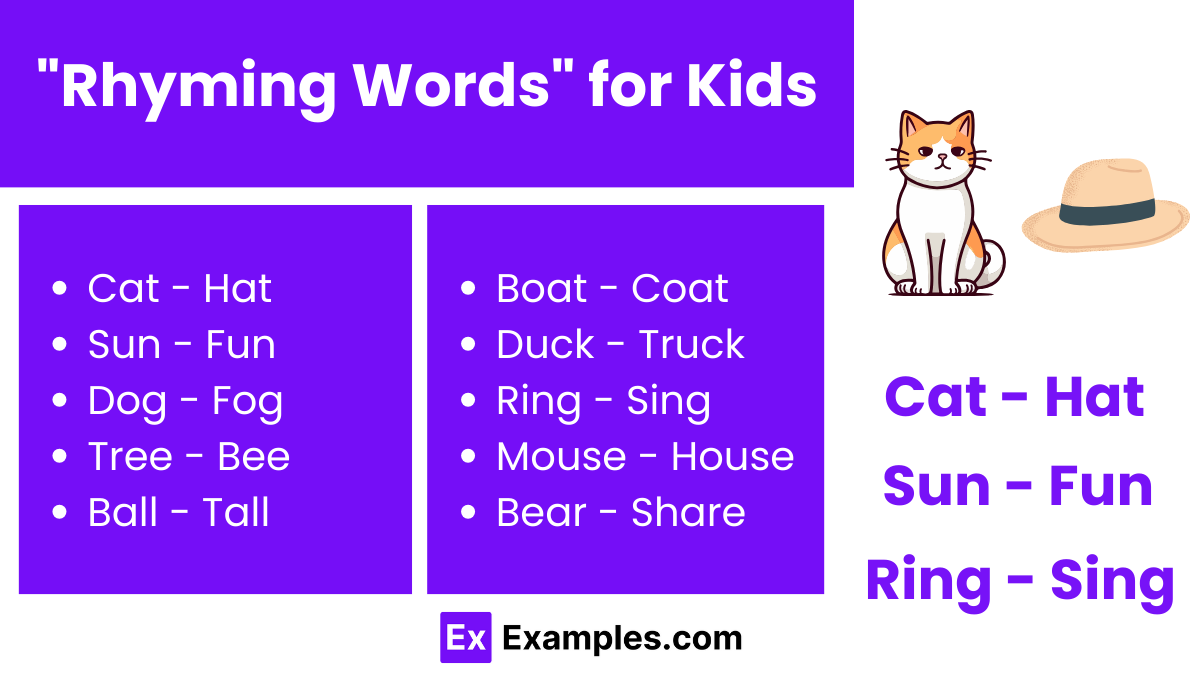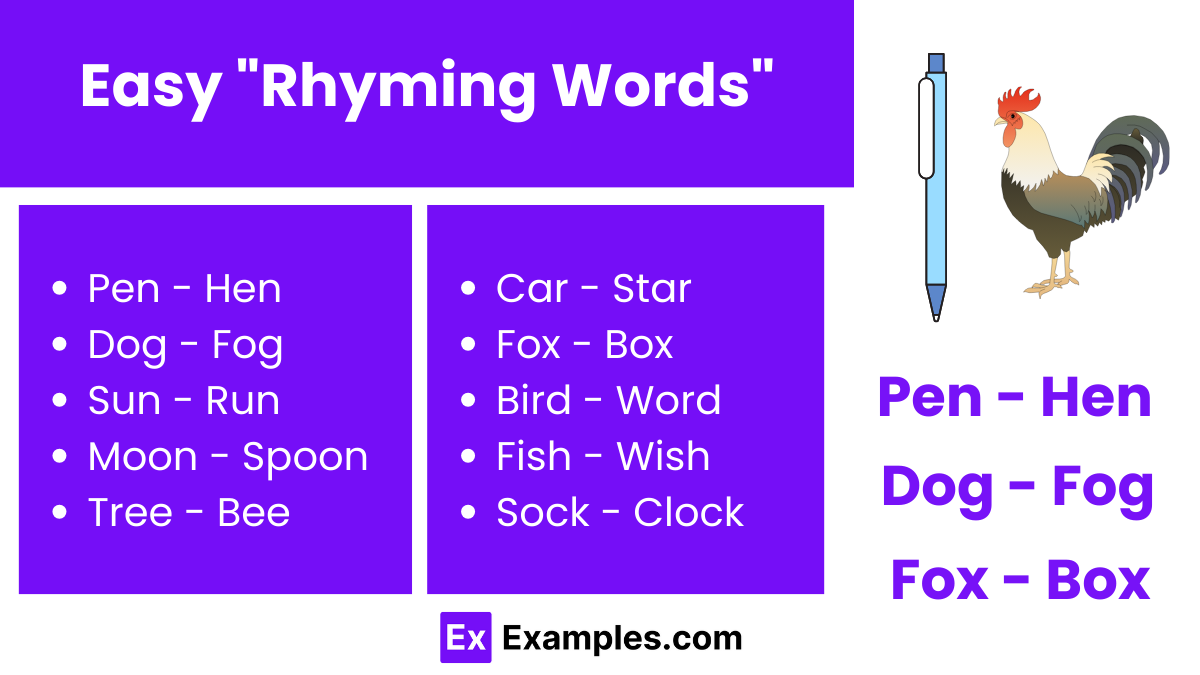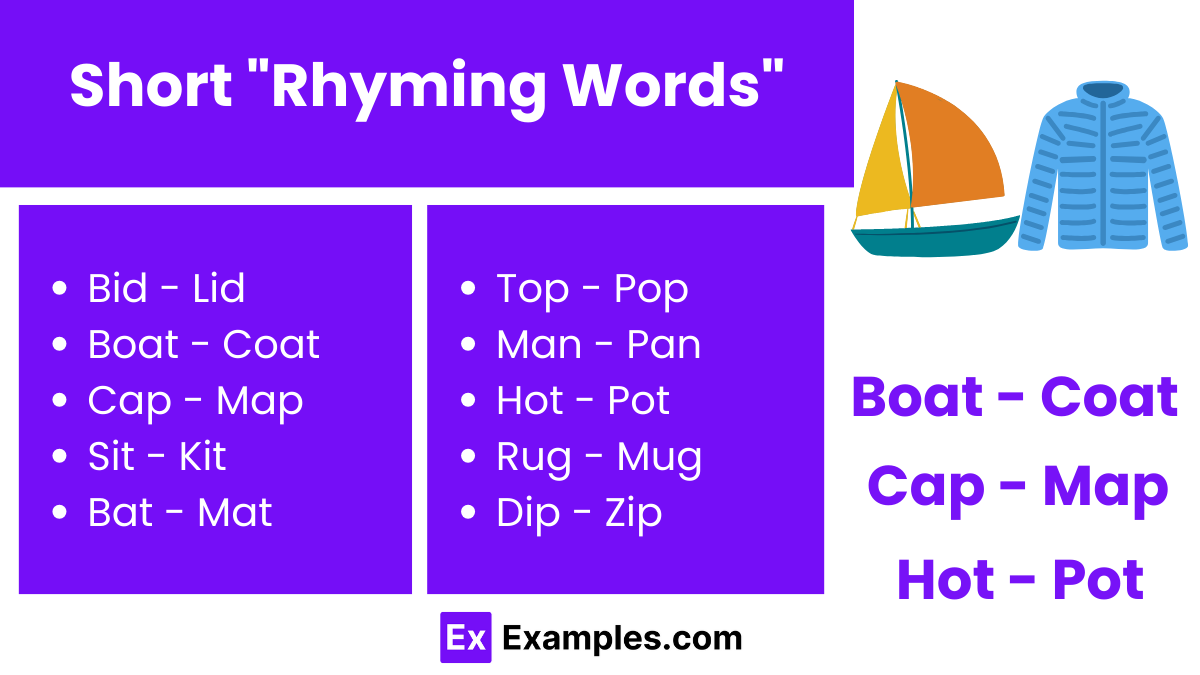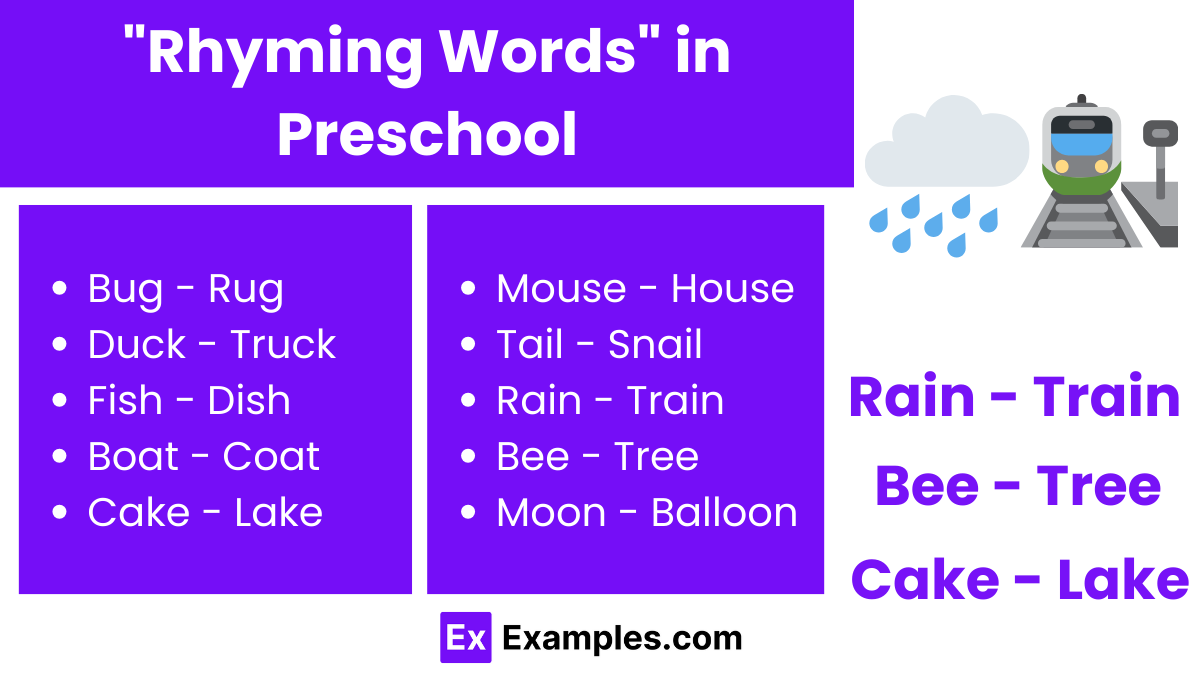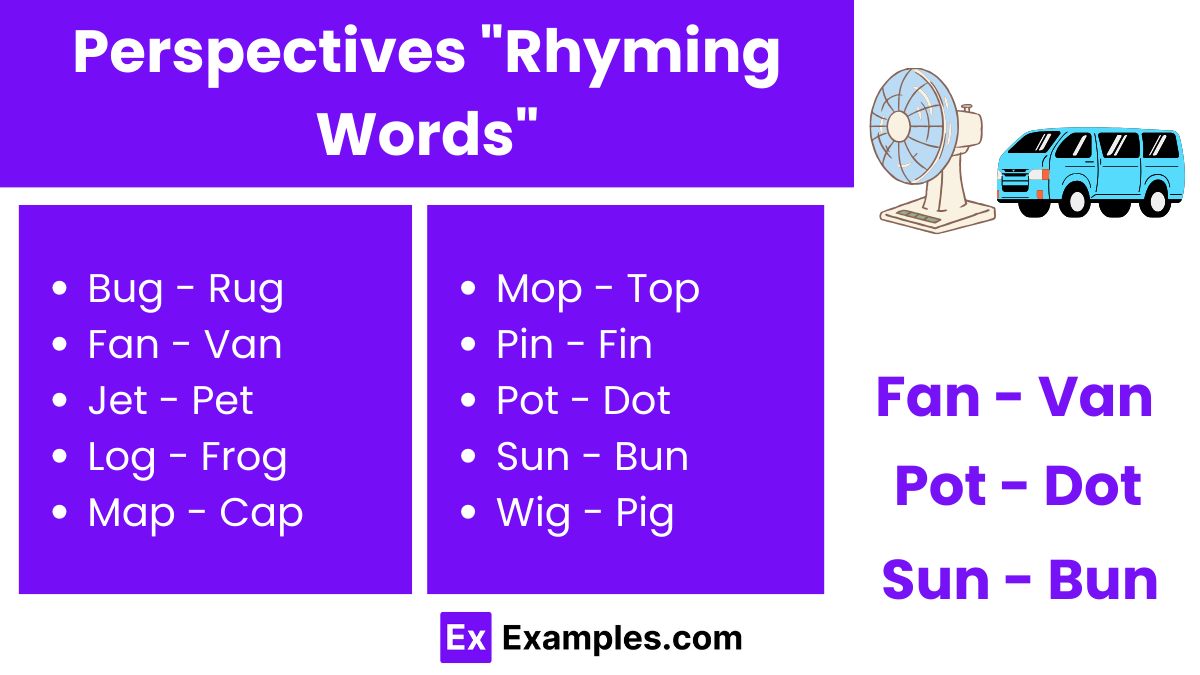450+ Rhyming Words List, Meaning, PDF
Dive into the melodious world of rhyming words, where sounds echo and meanings intertwine, creating a symphony of language that delights the ears and enriches the mind. Rhymes form the backbone of poetry, songs, and the art of storytelling, captivating audiences with their rhythmic patterns and memorable cadences. This exploration invites learners of all ages to discover the magic behind rhyming pairs, from the simple joy of matching endings to the complex art of constructing verses. Engage with us on this linguistic journey, where every word is a note in the vast orchestra of communication, waiting to resonate with its perfect match.
Download Most Commonly Used Rhyming Words - PDF
100+ Most Commonly used “Rhyming Words”
Creating a comprehensive guide to the most commonly used rhyming words enriches vocabulary, aids in language learning, and enhances creative expression. Rhyming words, pivotal in poetry, songwriting, and everyday language, serve as an essential tool for educators and students alike, promoting phonemic awareness and linguistic fluency. This exploration into rhymes offers a wide array of words, from simple, one-syllable sounds to complex, multisyllabic phrases, catering to various levels of language proficiency. Rhymes not only make learning more engaging but also facilitate memory retention and foster a deeper appreciation for the nuances of English. Presented here is a meticulously curated list of 300 rhyming words, organized in a table format to provide a valuable resource for expanding one’s lexicon and exploring the rhythmic beauty of language.
| Able – Table | Bark – Park | Clap – Trap | Dive – Hive |
| Ace – Base | Bat – Cat | Clear – Dear | Dock – Lock |
| Act – Fact | Beam – Dream | Climb – Time | Dog – Frog |
| Add – Bad | Bean – Clean | Clip – Ship | Doll – Roll |
| Age – Cage | Bear – Tear | Clock – Rock | Done – Sun |
| Air – Chair | Beat – Heat | Close – Rose | Door – Floor |
| Alight – Night | Bed – Red | Cloud – Loud | Dot – Hot |
| All – Ball | Bee – Tree | Coal – Hole | Down – Clown |
| Am – Jam | Beet – Sweet | Coat – Boat | Dream – Cream |
| And – Sand | Bell – Sell | Cold – Bold | Dress – Mess |
| Ant – Plant | Bend – Send | Cone – Bone | Drink – Think |
| Ape – Grape | Best – Nest | Cool – Pool | Drop – Shop |
| Arc – Park | Bet – Jet | Cop – Hop | Dull – Full |
| Are – Star | Big – Dig | Core – Bore | Dusk – Tusk |
| Arm – Farm | Bill – Hill | Corn – Born | Dust – Must |
| Art – Part | Bind – Find | Count – Mount | Each – Beach |
| Ash – Dash | Bird – Word | Court – Sort | Ear – Hear |
| Ask – Task | Bite – Sight | Cove – Stove | East – Beast |
| At – Bat | Blame – Game | Cow – How | Eat – Beat |
| Axe – Tax | Blank – Tank | Crab – Grab | Edge – Hedge |
| Back – Pack | Blast – Past | Crack – Black | Eel – Feel |
| Bad – Glad | Blaze – Maze | Cramp – Lamp | Egg – Beg |
| Bag – Rag | Bleed – Seed | Crank – Thank | Eight – Weight |
| Bake – Cake | Blend – End | Crash – Dash | Either – Neither |
| Ball – Call | Bless – Mess | Creep – Sleep | Elbow – Window |
| Band – Land | Blind – Mind | Crew – New | Elf – Shelf |
| Bang – Hang | Blink – Sink | Crisp – Wisp | Elm – Realm |
| Bank – Tank | Block – Rock | Croak – Soak | End – Bend |
| Bar – Car | Bloom – Room | Crop – Shop | Enter – Center |
| Bare – Share | Blow – Snow | Cross – Loss | Era – Area |
| Bark – Dark | Blue – True | Crowd – Loud | Eve – Sleeve |
“Rhyming Words” in Poem
Rhyming words in poetry weave a tapestry of sound and meaning, creating a rhythm that enchants the reader and elevates the narrative. These patterns of rhyme enrich the poetic form, adding layers of depth and musicality that resonate long after the poem is read. Poets meticulously choose rhyming words to evoke emotions, highlight themes, and connect with their audience on a profound level. Here, we explore a selection of rhyming words that frequently adorn verses, each pair a testament to the power of poetic expression.
- Love – Dove: Symbolizing affection and peace.
- Moon – June: Evoking nighttime romance and summertime.
- Rain – Pain: Reflecting sorrow and nature’s tears.
- Light – Night: Contrasting brightness with darkness.
- Stars – Mars: Connecting celestial beauty with the red planet.
- Dream – Stream: Flowing thoughts and waterways.
- Heart – Part: Signifying love and separation.
- Sky – High: The vastness above and lofty feelings.
- Day – Play: Daily routines and joyous activities.
- Life – Strife: The journey of existence and its challenges.
“Rhyming Words” for Kids
Rhyming words for kids not only make learning fun but also enhance phonemic awareness, a crucial aspect of early literacy. Through playful exploration of sounds, children develop a keen ear for language, paving the way for improved reading and pronunciation skills. Rhymes are instrumental in this developmental stage, offering a joyful and engaging method to introduce new vocabulary and concepts. Below is a list of rhyming words tailored for young learners, perfect for classroom activities, songs, and stories.
- Cat – Hat: A common pet and a headwear.
- Sun – Fun: The daytime star and enjoyment.
- Dog – Fog: A furry friend and misty weather.
- Tree – Bee: Nature’s giant and a buzzing insect.
- Ball – Tall: A round toy and height.
- Boat – Coat: A water vessel and outerwear.
- Duck – Truck: A waterbird and a large vehicle.
- Ring – Sing: A circular band and vocal music.
- Mouse – House: A small rodent and a place to live.
- Bear – Share: A large mammal and to divide with others.
Easy “Rhyming Words”
Easy rhyming words are the building blocks of language learning, providing a fun and engaging way for beginners to explore the sounds and rhythms of English. These words are ideal for early readers and writers, helping to reinforce phonics and pronunciation skills while boosting confidence. Through playful repetition and creative activities, students can effortlessly incorporate these rhymes into their vocabulary, setting a solid foundation for more complex linguistic concepts. Below is a list of easy rhyming words that are perfect for introducing the joy of language to young learners.
- Pen – Hen: A writing instrument and a female chicken.
- Dog – Fog: A domestic animal and misty weather.
- Sun – Run: The star at the center of our solar system and to move quickly.
- Moon – Spoon: Earth’s natural satellite and an eating utensil.
- Tree – Bee: A perennial plant and a buzzing insect.
- Car – Star: A vehicle and a celestial body of hot gases.
- Fox – Box: A wild animal and a container.
- Bird – Word: A flying creature and a unit of language.
- Fish – Wish: An aquatic vertebrate and a desire.
- Sock – Clock: A garment for the foot and a time-telling device.
Short “Rhyming Words”
Short rhyming words are delightful snippets of sound that captivate and encourage learners to delve into the rhythmic nature of English. These concise, punchy rhymes are especially useful for memory aids, making them perfect for early literacy programs. They help in the development of auditory discrimination skills and foster an environment where language is both a tool and a playground. Here’s a collection of short rhyming words that are easily memorizable and immensely enjoyable for students.
- Bid – Lid: To offer a price and a cover.
- Boat – Coat: It means a water vessel and an outer garment, respectively, representing items used in different contexts or environments.
- Cap – Map: Headwear and a representation of an area.
- Sit – Kit: To rest in a seated position and a set of tools.
- Bat – Mat: A piece of sports equipment and a floor covering.
- Top – Pop: The highest part and a loud, sharp sound.
- Man – Pan: An adult male and cooking utensil.
- Hot – Pot: Having a high temperature and a container for cooking.
- Rug – Mug: A floor covering and a large cup.
- Dip – Zip: To immerse quickly in a liquid and to fasten.
“Rhyming Words” in Preschool
In preschool, rhyming words are more than just a playful exercise; they are a cornerstone of early literacy development, enhancing phonemic awareness, listening skills, and language acquisition. Introducing preschoolers to rhyming words through songs, stories, and games nurtures an intuitive understanding of language rhythms, encouraging curiosity and a love for reading. These foundational words help young learners recognize sound patterns, an essential step towards reading and spelling proficiency. Below is a list of rhyming words specially selected for their relevance to preschool education, each pair designed to engage young minds and support their journey into the magical world of words.
- Bug – Rug: A small insect and a floor covering.
- Duck – Truck: A waterbird and a large vehicle.
- Fish – Dish: An aquatic animal and a plate for serving food.
- Boat – Coat: A watercraft and an item of clothing.
- Cake – Lake: A baked dessert and a large body of water.
- Mouse – House: A small rodent and a dwelling place.
- Tail – Snail: The rear end of an animal and a slow-moving mollusk.
- Rain – Train: Precipitation and a rail transport vehicle.
- Bee – Tree: A flying insect and a perennial plant.
- Moon – Balloon: The Earth’s satellite and a light inflatable ball
Perspectives “Rhyming Words”
Introducing “Rhyming Words” in preschool settings opens a world of auditory exploration, laying the groundwork for early literacy and phonemic awareness. These rhymes, simple yet captivating, are designed to engage young minds, making learning an interactive, enjoyable experience. Through rhyming words, children discover the rhythm of language, enhancing their ability to distinguish sounds, which is crucial for reading and spelling. This playful approach not only boosts vocabulary but also fosters creativity and memory. Here’s a concise list of rhyming words tailored for preschool learners, each pair chosen to delight, educate, and inspire curiosity in the classroom.
- Bug – Rug: A small insect and a floor covering.
- Fan – Van: A device for creating a current of air and a vehicle.
- Jet – Pet: An aircraft and a domestic animal.
- Log – Frog: A piece of a cut tree and an amphibian.
- Map – Cap: A diagram of an area and a headwear.
- Mop – Top: A cleaning tool and the highest part.
- Pin – Fin: A sharp piece of metal for fastening and a fish’s limb.
- Pot – Dot: A container for cooking and a small round mark.
- Sun – Bun: The star that the Earth orbits around and a type of bread.
- Wig – Pig: A head covering made from real or synthetic hair and a farm animal
In conclusion, Rhyming words enrich language learning at every stage, from the playful discovery in preschool to the profound exploration of perspectives in advanced studies. They are pivotal in fostering phonemic awareness, enhancing vocabulary, and igniting a passion for the musicality of language. This article has journeyed through the vibrant world of rhymes, showcasing their power to educate, inspire, and transform the linguistic experience for students and teachers alike.



